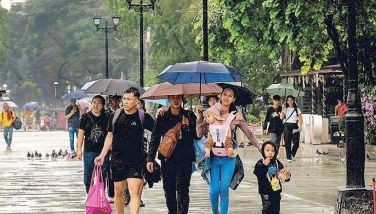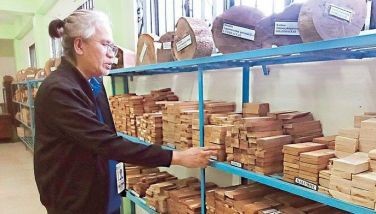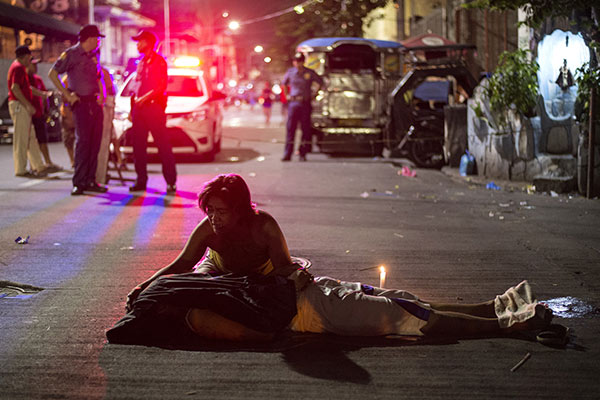Stockholm meet to pass treaty vs toxic chemicals
May 20, 2001 | 12:00am
A landmark global treaty will be signed by 120 countries in Stockholm, Sweden on May 23 to eliminate the world’s 12 most dangerous chemicals classified as persistent organic pollutants (POPs).
Environment Secretary Heherson Alvarez, who heads the four-man Philippine delegation attending the event, will sign on behalf of President Arroyo a treaty with various countries during the Stockholm Convention on Persistent Organic Pollutants.
Alvarez said the treaty will make it possible for the Philippines to call on international help in the clean-up of toxic dumps in Clark and Subic left by the American military, which resulted in a number of deaths.
"It is the intention of the Arroyo administration," Alvarez added, "to work for the rapid approval and ratification of the treaty in the Senate." The treaty shall take effect as soon as 50 countries have ratified it, estimated to be reached by year 2004 at the latest.
The 12 chemicals, also known as the "Dirty Dozen," are considered the most dangerous because of four common characteristics – they are toxic and persistently resist normal processes that break down contaminants; they accumulate in the body fat of people, marine mammals and other animals and are passed from mother to fetus; and they can travel great distances.
Among these toxic chemicals are widely used agricultural pesticides such as Aaldrin, Chlordane, DDT, Dieldrin, Endrin, Heptachlor, Hexachlorobenzene, and Mirex.
Also included are polychlorinated biphenyls (PCBs) that are used in capacitors, transformers, paint, adhesives, plasticisers, carbonless copy paper, hydraulic and heat transfer systems. The two other chemicals, dioxins and furans, are byproducts of PCB manufacturing.
Even small amounts of POPs can wreak havoc in human and animal tissue, causing nervous system damage, diseases of the immune system, reproductive and developmental disorders and cancers.
Under the Stockholm Convention, a Global Environmental Facility-funded project will be set up in the Philippines and one other country that will establish safe non-burn technologies to destroy hazardous stockpiles of PCBs.
The Philippines was chosen primarily because of its forward-looking legislation, Republic Act 8749, commonly known as the Clean Air Act which Alvarez authored himself in Congress.
Other members of the Philippine panel are Director Noralyn Jubaira-Baja of the Department of Foreign Affairs, and officials of the Philippine Embassy to Sweden Ambassador Erlinda Basilio and Minister Aileen Bugarin.
Environment Secretary Heherson Alvarez, who heads the four-man Philippine delegation attending the event, will sign on behalf of President Arroyo a treaty with various countries during the Stockholm Convention on Persistent Organic Pollutants.
Alvarez said the treaty will make it possible for the Philippines to call on international help in the clean-up of toxic dumps in Clark and Subic left by the American military, which resulted in a number of deaths.
"It is the intention of the Arroyo administration," Alvarez added, "to work for the rapid approval and ratification of the treaty in the Senate." The treaty shall take effect as soon as 50 countries have ratified it, estimated to be reached by year 2004 at the latest.
The 12 chemicals, also known as the "Dirty Dozen," are considered the most dangerous because of four common characteristics – they are toxic and persistently resist normal processes that break down contaminants; they accumulate in the body fat of people, marine mammals and other animals and are passed from mother to fetus; and they can travel great distances.
Among these toxic chemicals are widely used agricultural pesticides such as Aaldrin, Chlordane, DDT, Dieldrin, Endrin, Heptachlor, Hexachlorobenzene, and Mirex.
Also included are polychlorinated biphenyls (PCBs) that are used in capacitors, transformers, paint, adhesives, plasticisers, carbonless copy paper, hydraulic and heat transfer systems. The two other chemicals, dioxins and furans, are byproducts of PCB manufacturing.
Even small amounts of POPs can wreak havoc in human and animal tissue, causing nervous system damage, diseases of the immune system, reproductive and developmental disorders and cancers.
Under the Stockholm Convention, a Global Environmental Facility-funded project will be set up in the Philippines and one other country that will establish safe non-burn technologies to destroy hazardous stockpiles of PCBs.
The Philippines was chosen primarily because of its forward-looking legislation, Republic Act 8749, commonly known as the Clean Air Act which Alvarez authored himself in Congress.
Other members of the Philippine panel are Director Noralyn Jubaira-Baja of the Department of Foreign Affairs, and officials of the Philippine Embassy to Sweden Ambassador Erlinda Basilio and Minister Aileen Bugarin.
BrandSpace Articles
<
>
- Latest
- Trending
Trending
Latest
Trending
Latest
Recommended





























